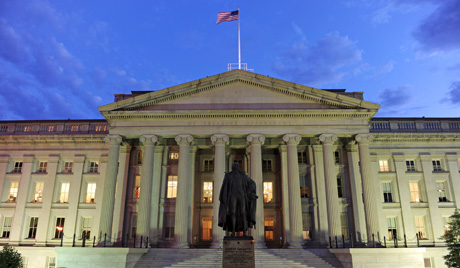
 A US default on its obligations forced by Congress
not raising the country's borrowing ceiling would have catastrophic effects,
the Treasury warned Thursday.
A US default on its obligations forced by Congress
not raising the country's borrowing ceiling would have catastrophic effects,
the Treasury warned Thursday.
With the government likely to exhaust its cash reserves around October 17, the Treasury said being forced into non-payment of any of its obligations - and in particular its debt - would spark turmoil in financial markets and possibly send the country back to a recession as deep as that of 2008-2009.
"In the event that a debt limit impasse were to lead to a default, it could have a catastrophic effect on not just financial markets but also on job creation, consumer spending and economic growth," the Treasury said in a report.
"Credit markets could freeze, the value of the dollar could plummet, US interest rates could skyrocket, the negative spillovers could reverberate around the world, and there might be a financial crisis and recession that could echo the events of 2008 or worse."
The government is already just barely operating below the $16.7 trillion debt ceiling, using "extraordinary measures" since May to meet a chronic deficit of about $60 billion a month.
Those measures will be exhausted by October 17, leaving the Treasury with only a small amount of cash to meet constant payment obligations.
The Treasury said that the impasse in Congress over passing a new budget and raising the debt ceiling had already tentatively affected markets, echoing the fight over raising the limit two years ago - which went to the brink of default and, though that did not happen, still saw the US triple-A credit rating cut by Standard & Poor's.
"A large, adverse, and persistent financial shock like the one that began in late 2011 would result in a slower economy with less hiring and a higher unemployment rate than would otherwise be the case," it warned.
Obama stressed to congressional leaders he will not negotiate over shutdown, debt limit
President Barack Obama stressed to congressional leaders on Wednesday in White House talks that he will not negotiate with Republicans over a government shutdown or raising the US debt limit, the White House said.
After more than an hour of talks that did not lead to a breakthrough, the White House issued a statement that said Obama remains hopeful that "common sense will prevail" in the budget standoff.
"The president made clear to the leaders that he is not going to negotiate over the need for Congress to act to reopen the government or to raise the debt limit to pay the bills Congress has already incurred," the White House said.
Democrats say Obama rejected Republican arguments on government shutdown in meeting
Senate Majority Leader Harry Reid emerged from more than an hour of talks with Obama, House of Representatives Speaker John Boehner, the top US Republican and other congressional leaders to say Obama told Republicans "he will not stand" for their tactics.
House Democratic leader Nancy Pelosi said Obama will not invoke a clause in the 14th amendment of the US Constitution as a way to lift the U.S. debt ceiling on his own. The United States will run out of cash to pay its bills by Oct. 17 if the debt ceiling is not raised.
Republican Speaker Boehner says Obama refused to negotiate in White House meeting
House of Representatives Speaker John Boehner emerged from White House talks on Wednesday to say that President Barack Obama again refused to negotiate with them to end a government shutdown.
After more than an hour of talks between Obama and congressional leaders, the top Republican in Washington told reporters it was a polite conversation, but essentially made no progress.
Obama digs heels in budget row with Congress
US President Barack Obama ruled out negotiations on budget issues with Congress on Wednesday until lawmakers end a US government shutdown by approving spending measures.
In a CNBC interview, Obama described himself as exasperated that Republicans refused to drop demands that led to the government shutting down on Tuesday. "Am I exasperated? Absolutely I'm exasperated," he said, because the shutdown was totally unnecessary.
Obama said Wall Street should be concerned that a faction of Republicans in the House of Representatives seemed willing to allow the United States to default on its debt in order to push their demand that funding be cut for Obama's signature healthcare law.
Obama 'exasperated' by goverment's shutdown
"Absolutely I am exasperated, because this is entirely unnecessary," Obama said in an interview with CNBC.
Obama said the crisis could be solved quickly if House of Representatives Speaker John Boehner called a vote on a bill to fund the government, stripped of provisions designed to gut his health care bill which caused previous funding measures to die in the Senate.
He also called on Congress to vote to raise the US debt ceiling before the middle of the month, when the US government will run out of money to pay its bills in a scenario that could trigger a debt default.
"If and when ... that vote takes place and the government reopens, and if and when they vote to make sure Congress pays our bills on time so America does not default on costs it's already accrued, then I am prepared to have a reasonable, civil negotiation around a whole slew of issues," Obama said.



_jpg/250px-ElbeDay1945_(NARA_ww2-121).jpg)





